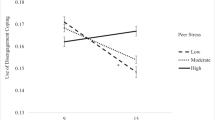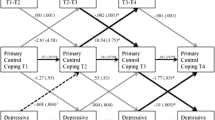Abstract
The aim of this study was to investigate age and gender effects of children’s and adolescents’ coping with common stressors in 3 age groups (late childhood, early, and middle adolescence). Furthermore, age and developmental differences in situation-specific coping with 2 stress domains were examined. N = 1,123 participants (ages 8 to 13 years) were asked to complete the German Coping Questionnaire for Children and Adolescents (Hampel et al., 2001) in response to both an interpersonal and an academic stressor. Adolescent boys and girls, as well as girls from all age ranges scored lower on adaptive and higher on maladaptive coping strategies. With regard to interaction effects, female early adolescents coped maladaptively with common stressors, showing a decreased employment of adaptive (e.g., distraction, positive self-instructions) and an enhanced use of maladaptive coping strategies (e.g., rumination, aggression). Situation-specific coping did not differ consistently with age and gender. Implications of the findings for mental health care and developing clinical treatment of children and adolescents are discussed.
Similar content being viewed by others
References
Boekaerts, M., and Röder, I. (1999). Stress, coping, and adjustment in children with a chronic disease: A review of the literature. Disabil. Rehab. 21: 311–337.
Causey, D. L., and Dubow, E. F. (1992). Development of a self-report measure for elementary school children. J. Clin. Child Psychol. 21: 47–59.
Compas, B. E., Banez, G. A., Malcarne, V., and Worsham, N. (1991). Perceived control and coping with stress: A developmental perspective. J. Soc. Issues 47: 23–34.
Compas, B. E., Connor-Smith, J. K., Saltzman, H., Harding Thomsen, A., and Wadsworth, M. E. (2001). Coping with stress during childhood and adolescence: Problems, progress, and potential in theory and research. Psychol. Bull. 127: 87–127.
Compas, B. E., Langrock, A. M., Keller, G., Merchant, M. J., and Copeland, M. E. (2002). Children coping with parental depression: Processes of adaptation to family stress. In Goodmann, S. H., and Gotlib, I. H. (eds.), Children of Depressed Parents: Mechanisms of Risk and Implications for Treatment. American Psychological Association, Washington, DC, pp. 227–252.
Compas, B. E., Malcarne, V. L., and Fondacaro, K. M. (1988). Coping with stressful events in older children and young adolescents. J. Consult. Clin. Psychol. 56: 405–411.
Compas, B. E., Orosan, P. G., and Grant, K. E. (1993). Adolescent stress and coping: Implications for psychopathology during adolescence. J. Adolesc. 16: 331–349.
Connor-Smith, J. K., Compas, B. E., Wadsworth, M. E., Harding Thomsen, A. H., and Saltzman, H. (2000). Responses to stress in adolescence: Measurement of coping and involuntary stress responses. J. Consult. Clin. Psychol. 68: 976–992.
de Anda, D., Baroni, S., Boskin, L., Buchwald, L., Morgan, J., Ow, J., Siegel Gold, J., and Weiss, R. (2000). Stress, stressors and coping strategies among high school students. Child. Youth Serv. Rev. 22: 441–463.
de Anda, D., Bradley, M., Collada, C., Dunn, L., Kubota, J., Hollister, V., Miltenberger, J., Pulley, J., Susskind, A., Thompson, L. A., and Wadsworth, T. (1997). A study of stress, stressors, and coping strategies among middle school adolescents. Soc. Work Educ. 19: 87–98.
Dise-Lewis, J. E. (1988). The life events and coping inventory: An assessment of stress in children. Psychosom. Med. 50: 484–499.
Donaldson, D., Prinstein, M., Danovsky, M., and Spirito, A. (2000). Patterns of children’s coping with life stress: Implications for clinicians. Am. J. Orthopsychiat. 70: 351–359.
Fields, L., and Prinz, R. J. (1997). Coping and adjustment during childhood and adolescence. Clin. Psychol. Rev. 17: 937–976.
Frydenberg, E., and Lewis, R. (1993). Boys play sport and girls turn to others: Age, gender and ethnicity as determinants of coping. J. Adolesc. 16: 253–266.
Frydenberg, E., Lewis, R., Kennedy, G., Ardila, R., Frindte, W., and Hannoun, R. (2003). Coping with concerns: An explanatory comparison of Australian, Colombian, German, and Palestinian adolescents. J. Youth Adolesc. 32: 59–66.
Griffith, M. A., Dubow, E. F., and Ippolito, M. F. (2000). Developmental and cross-situational differences in adolescents’ coping strategies. J. Youth Adolesc. 29: 183–204.
Hampel, P., Petermann, F., and Dickow, B. (2001). Stressverarbeitungsfragebogen von Janke und Erdmann angepasst für Kinder und Jugendliche (SVF-KJ) Hogrefe, Göttingen The German Coping Questionnaire by Janke and Erdmann adapted for children and adolescents
Herman-Stahl, M. A., Stemmler, M., and Petersen, A. C. (1995). Approach and avoidant coping: Implications for adolescent mental health. J. Youth Adolesc. 24: 649–665.
Horn, J. L. (1965). A rationale and test for the number of factors in factor analysis. Psychometrika 30: 179–185.
Kraaij, V., Garnefski, N., de Wilde, E. J., Dijkstra, A., Gebhardt, W., Maes, S., and ter Doest, L. (2003). Negative life events and depressive symptoms in late adolescence: Bonding and cognitive coping as vulnerability factors? J. Youth Adolesc. 32: 185–193.
Lazarus, R. S., and Folkman, S. (1984). Stress, Appraisal and Coping. Springer, New York.
Nolen-Hoeksema, S., Girgus, J. S., and Seligman, M. E. P. (1991). Sex differences in depression and explanatory style in children. J. Youth Adolesc. 20: 233–245.
Patterson, J. M., and McCubbin, H. I. (1987). Adolescent coping style and behaviors: Conceptualization and measurement. J. Adolesc. 10: 163–186.
Petersen, A. C., Sarigiani, P. A., and Kennedy, R. E. (1991). Adolescent depression: Why more girls? J. Youth Adolesc. 20: 247–271.
Reynolds, L. K., O’Koon, J. H., Papademetriou, E., Szczygiel, S., and Grant, K. (2001). Stress and somatic complaints in low-income urban adolescents. J. Youth Adolesc. 30: 499–514.
Roecker, C. E., Dubow, E. F., and Donaldson, D. (1996). Cross-situational patterns in children’s coping with observed interpersonal conflict. J. Clin. Child Psychol. 25: 288–299.
Rossman, B. B. R. (1992). School-age children’s perceptions of coping with distress: Strategies for emotion regulation and the moderation of adjustment. J. Child Psychol. Psychiat. 33: 1373–1397.
Roth, S., and Cohen, L. F. (1986). Approach, avoidance, and coping with stress. Am. Psychol. 41: 813–819.
Rothbaum, F., Weisz, J. R., and Snyder, S. S. (1982). Changing the world and changing the self: A two-process model of perceived control. J. Pers. Soc. Psychol. 42: 5–37.
Ryan, N. M. (1989). Identification of children’s coping strategies from the school-agers’ perspective. Res. Nurs. Health 12: 111–122.
Seiffge-Krenke, I. (1993). Coping behavior in normal and clinical samples: More similarities than differences? J. Adolesc. 16: 285–304.
Seiffge-Krenke, I. (1995). Stress, Coping and Relationships in Adolescence. Erlbaum, Hillsdale.
Seiffge-Krenke, I. (2000). Causal links between stressful events, coping style, and adolescent symptomatology. J. Adolesc. 23: 675–691.
Seiffge-Krenke, I., and Klessinger, N. (2000). Long-term effects of avoidant coping on adolescents’ depressive symptoms. J. Youth Adolesc. 29: 617–630.
Seiffge-Krenke, I., and Shulman, S. (1990). Coping style in adolescents. A cross-cultural study. J. Cross-Cult. Psychol. 21: 351–377.
Seiffge-Krenke, I., and Stemmler, M. (2002). Factors contributing to gender differences in depressive symptoms: A test of three developmental models. J. Youth Adolesc. 31: 405–417.
Spirito, A., Stark, L. J., Grace, N., and Stamoulis, D. (1991). Common problems and coping strategies reported in childhood and early adolescence. J. Youth Adolesc. 20: 531–544.
Steinhausen, H.-C., and Winkler Metzke, C. (2001). Risk, compensatory, vulnerability, and protective factors influencing mental health in adolescence. J. Youth Adolesc. 30: 259–280.
Wertlieb, D., Weigel, C., and Feldstein, M. (1987). Measuring children’s coping. Am. J. Orthopsychiat. 57: 548–560.
Wolchik, S. A., and Sandler, I. N. (1997). Handbook of Children’s Coping. Linking Theory and Intervention. Plenum, New York.
Author information
Authors and Affiliations
Corresponding author
Additional information
Professor of Rehabilitation Psychology, Center of Clinical Psychology and Rehabilitation, University of Bremen, Germany. Received her PhD from the Free University of Berlin in 1994. Major research interests are stress, coping, and stress management in children and adolescents.
Professor of Psychology, Center of Clinical Psychology and Rehabilitation, University of Bremen, Germany. Received his PhD from the University of Bonn in 1977. Major research interests are diagnostics, clinical child psychology, and rehabilitation research.
Rights and permissions
About this article
Cite this article
Hampel, P., Petermann, F. Age and Gender Effects on Coping in Children and Adolescents. J Youth Adolescence 34, 73–83 (2005). https://doi.org/10.1007/s10964-005-3207-9
Received:
Revised:
Accepted:
Issue Date:
DOI: https://doi.org/10.1007/s10964-005-3207-9




